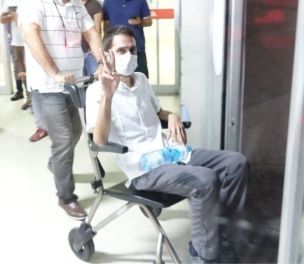Click to read the article in Turkish
The European Court of Human Rights (ECtHR) has found an application by lawyers Ebru Timtik and Aytaç Ünsal when they were on a death fast inadmissible, considering only the government's response.
In the judgment, the ECtHR made no mention of detailed reports by the Turkish Medical Association (TTB) on the conditions of the prisoners' rooms in the hospitals where the lawyers were held.
The court decision included the statement that Timtik and Ünsal "voluntarily risked their lives."
After a months-long death fast, Timtik lost her life on August 27, 2020, in the hospital. Ünsal ended his death fast after a court ordered his release on September 3.
The European court had previously rejected a similar application for an injunction by imprisoned educators Nuriye Gülmen and Semih Özakça, who had also been on a death fast. Their arrest did not pose permanent damage to their lives, it had concluded.
The government's response
The decision pronounced yesterday (July 1) mostly referred to the government's response to the court.
In its response, the government asserted that the rooms where the lawyers were held were "compliant with pandemic conditions" and they were "not deprived of any kind of medical treatment." Those who entered the rooms wore masks, the physical distancing rule was followed and only those with a negative PCR test were allowed to enter the rooms, according to the government.
It referred to the lawyers' refusal to receive treatment as "not cooperating with doctors," which was also cited in the ECtHR decision.
The TTB report
The court underlined that Timtik and Ünsal "voluntarily put their lives at risk" and they refused any intervention even though their state of health would threaten their lives.
It also noted that they were hospitalized as soon as their health deteriorated.
The lawyers had alleged that the conditions of the hospital rooms where they were held was threatening their lives. The ECtHR claimed that the conditions in question were not included in their application.
However, the attorneys of Timtik and Ünsal had submitted a report by the TTB to the court. The report included a medical explanation of the situation of the prisoners' rooms and their effects on people's health. The European court did not take into account this report.
"Authorities can't be criticized"
The judicial and administrative authorities can't be criticized for not having properly examined and managed the situation as they immediately recognized the risks to the applicants' health, the court noted.
Therefore, the court concluded, articles 2 and 3 of the ECHR on the right to life and the prohibition of torture and degrading treatment were not violated.
After an application to the TTB on August 20, 2020, the association prepared a report signed by Forensic Medicine Specialist Prof. Dr. Şebnem Korur-Fincancı, Public Health Specialist Prof. Dr. Onu Hamzaoğlu, Psychiatry Specialist Dr. Sezai Berber and Internal Diseases Specialist Dr. Zeki Gül.
Contrary to the government's claims, the association said that prisoners' rooms posed a life-threatening risk.
It said the air conditioner worked constantly and lights were left open for 24 hours in Timtik's room. Officers entered the room without masks and hygiene was not taken into consideration, according to the report.
"Since Ebru Timtik has made it clear that she will not consent to examinations and tests under these circumstances, the deprivation of her liberty makes medical follow-up impossible," says the report, adding that it was not possible to regularly check blood values and electrolyte levels of the lawyers under those conditions.
Due to the loss of the muscle tissues, Timtik was unable to take care of herself on her own and she had difficulties standing up due to balance disorder and nerve damage, according to the report.
"Not suitable for a healthy person"
With a weakened immune system, Timtik was exposed to the hospital's central air conditioning, the association noted.
Timtik was unable to take a shower due to the low temperature in the room and her privacy was violated as the room had a glass door, it said.
Timtik's mental health was also negatively affected by people eating just outside of the room, the noise of people and air conditioning and the lights being kept open constantly, said the TTB.
"The prisoners' ward is not suitable not only for patients in Ebru Timtik's medical condition but also for a healthy person in terms of physical conditions," it concluded. (AS/VK)















